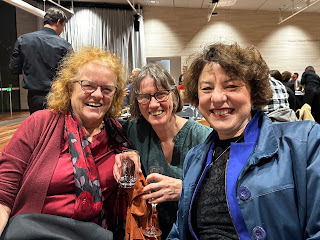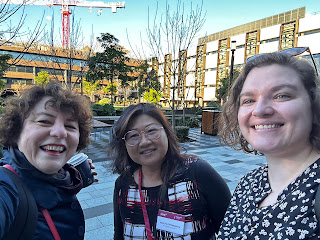IMPORTANT DATA FROM:
Australian Institute of Health and Welfare (2022) People with disability in Australia 2022, catalogue number
DIS 72, AIHW, Australian Government.
https://www.aihw.gov.au/getmedia/3bf8f692-dbe7-4c98-94e0-03c6ada72749/aihw-dis-72-people-with-disability-in-australia-2022.pdf.aspx?inline=true
Australian Bureau of Statistics’ (ABS) 2018
Survey of Disability, Ageing and Carers (SDAC).
"Nearly one-third (32%) of people with disability – about 1.4 million or 5.7% of the
Australian population – have severe or profound disability. This means sometimes or
always needing help with daily self-care, mobility or communication activities, having
difficulty understanding or being understood by family or friends, or communicating
more easily using sign language or other non-spoken forms of communication
(ABS 2019a)." (p. 26)
Of people with disability living in households who need help with at least one activity:
• the need for help with cognitive or emotional tasks decreases with age (79% or
362,000 of those aged under 25, 45% or 422,000 of those aged 25–64, and 19% or
208,000 of those aged 65 and over)
• those aged under 25 are more likely (41% or 187,000) to need help with oral
communication than those aged 25–64 (5.9% or 55,000) or 65 and over (5.8% or
64,000) (p. 36)
Of the selected chronic conditions, stroke is associated with a high level of core activity
limitation:
• 42% (or 37,000) of people with stroke as their main condition have severe or
profound core activity limitation
• 17% (or 15,000) have mild or moderate core activity limitation
• 39% (or 33,000) have no core activity limitations, but may still have disability not
related to core activities. Of the selected chronic conditions, asthma is associated with the lowest level of core
activity limitation:
• 1.5% (or 13,000) of people with asthma as their main condition have severe or
profound core activity limitation
• 4.6% (or 38,000) have mild or moderate core activity limitation
• 94% (782,000) have no core activity limitation, but may still have disability not related
to core activities (Figure CHRONIC.3). (p. 96)
Not everyone with disability receives all the help they need from formal services.
Common activities for which the need for formal assistance was unmet include:
• cognitive or emotional tasks (40% or 286,000 people with disability, aged 64 and
under, living in households who need formal assistance with that activity)
• communication (38% or 86,000)
• property maintenance (31% or 139,000)
• household chores (31% or 124,000)
• mobility (20% or 98,000) (ABS 2019).
The reasons given for not receiving any or more help from an organised service with at
least one activity include:
• service costs too much (38% or 199,000 people with disability, aged 64 and under,
with an unmet need for formal assistance)
• did not know of service (18% or 95,000)
• not eligible for service (16% or 84,000)
• service does not provide sufficient hours (14% or 73,000)
• unable to arrange service (14% or 72,000)
• no service available (13% or 68,000) (ABS 2019).
Reasons for not receiving any or more help from an organised service with at least one
activity differ by remoteness. Among people with disability aged 64 and under, with an
unmet need for formal assistance:
• people living in Outer regional and remote areas are more likely (24% or 15,000)
not to receive help due to no service being available than those living in Major cities
(9% or 31,000)
• people living in Inner regional areas are more likely (23% or 26,000) not to receive
help due to not being eligible for service than those living in Major cities (14% or
49,000) and Outer regional and remote areas (15% or 9,000)
• people living in Major cities are more likely (40% or 140,000) not to receive help due
to service costing too much than those living in Outer regional and remote areas
(27% or 16,000) (ABS 2019). (p. 133)
Household, Income and Labour Dynamics in
Australia (HILDA) Survey
Difficulties experienced.
Some people with disability experience difficulties at their school or educational
institution, such as learning, fitting in socially and communicating.
School students (primary and secondary). Not all school students (aged 5–18) with disability have difficulty at their school – more
than one-third (36% or 135,000) do not. Some who have no difficulty have a schooling
restriction (16% of school students with disability, or 61,000) while others do not (20% of
school students with disability, or 76,000).
This varies by disability group and remoteness: • More than 4 in 5 (81% or 122,000) students with psychosocial disability have
difficulty at school compared with 3 in 5 (59% or 54,000) of those with physical
disability. • More than two-thirds (69% or 59,000) of students living in Inner regional areas have
difficulty compared with 3 in 5 (59% or 23,000) of those living in Outer regional and
remote areas (ABS 2019).
Of those who have difficulty at school, the most common experienced are:
• learning difficulties (68% or 165,000)
• fitting in socially (56% or 137,000)
• communication difficulties (44% or 107,000)
• intellectual difficulties (22% or 54,000)
• sports participation (17% or 42,000)
• difficulty sitting (15% or 37,000) (ABS 2019). (pp. 298-299)
Non-school students
Not all non-school students with disability have difficulty at their educational institution
– almost three-quarters (74% or 137,000) do not. Some with no difficulty have a nonschool educational restriction (19% of non-school students with disability, or 35,000)
while others do not (53% of non-school students with disability, or 99,000).
Of those who have difficulty, the most common experienced are:
• learning difficulties (32% or 17,000)
• fitting in socially (25% or 13,000)
• communication difficulties (20% or 11,000) (ABS 2019).
References
ABS (Australian Bureau of Statistics) (2019) Microdata: disability, ageing and carers,
Australia, 2018, ABS cat. no. 4430.0.30.002, ABS, AIHW analysis of TableBuilder data,
accessed 14 October 2021. https://www.abs.gov.au/statistics/microdatatablebuilder/available-microdata-tablebuilder/disability-ageing-and-carers-australia
DSS (Department of Social Services) and MIAESR (Melbourne Institute of Applied
Economic Social Research) (2019) The Household, Income and Labour Dynamics in Australia
(HILDA) Survey, general release 18 (wave 17), doi:10.26193/IYBXHM, ADA Dataverse, AIHW
analysis of unit record data, accessed 15 December 2021.





















%20-%20Perspectives.png)


























